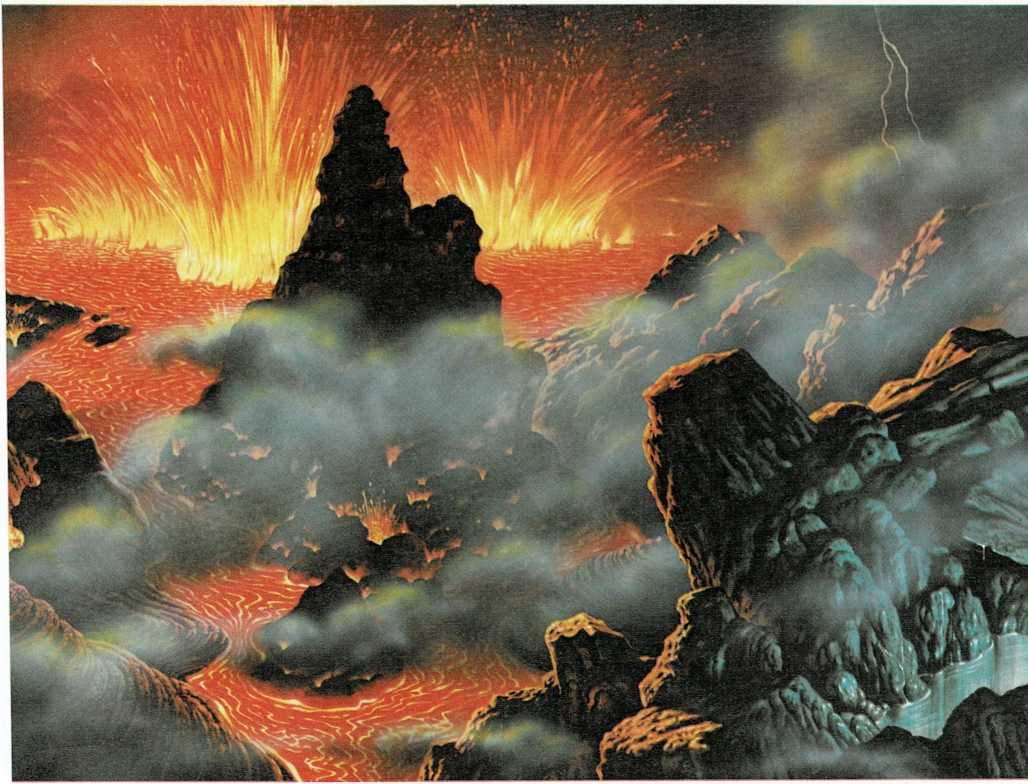The cloud in space
When Rick’s uncle came for his usual Sunday visit, Rick was waiting for
him at the door. Uncle Frank was a scientist—an astronomer—and Rick
had an important question to ask him.
“Uncle Frank, can you tell me how the world began?”
His uncle sat down and lit his pipe. “Well,” he said, “I can tell you
how scientists think it began.
“We know that stars explode. We think that when they do, they give off
huge clouds of gas and dust. This gas and dust is made up of many
chemicals. There are clouds like this floating in space right now.
“Our solar system—the Sun, the Earth, and the other eight
planets—was formed billions of years ago. We think it was made of
clouds of gas and dust from the explosion of several stars. Gravity, the
force that pulls things toward each other, pulled the different clouds
of gas and dust together until there was one big cloud, hundreds of
millions of miles wide.
“The cloud was probably spinning around, as all things in space do. The
spinning, and the pull of gravity, made the cloud take the shape of a
huge disk, like a wheel. Gravity pulled the lighter bits of gas and dust
into a huge blob in the middle of the disk. This was the beginning of
the Sun. Heavier bits of gas and dust formed smaller blobs that circled
the big blob. One of these smaller blobs was the beginning of the
Earth.”
“How did the Earth get hard if it was just gas and dust?” Rick asked.
“And where did the oceans and the plants and the animals come from?”
“Whoa!” cried Uncle Frank. “One thing at a time.” He took a puff on his
pipe and then went on. “When
things in space bump together, they make heat.
The gravity of the blob that became Earth kept pulling more and more
material to itself. All that stuff crashing into the blob, probably
every second for millions of years, made a lot of heat! The blob got so
hot it became a glowing, molten ball.
“When the blob had pulled in all the material that was around it, it
began to cool. There were tiny bits of iron and other hard stuff in the
dust. When the Earth cooled, this stuff got hard again. The outside

of the Earth became a hard crust. The inside
was still soft, but it was slowly cooling. Actually, it’s still
cooling. Even now, the center of the Earth is very hot and soft.
“As the Earth cooled, it gave off water vapor— steam. When it grew
cooler, the steam turned to water and filled up all the cracks and
valleys on the earth’s surface. That’s how the rivers and oceans were
made.
“The Earth was still hot, so the water was warm and steamy. It was full
of chemicals, too. And things

were happening to it. Rays from space were going into it, lightning was
striking it, and volcanoes were pouring hot rocks into it. All these
things made the chemicals join together, change, and break apart, over
and over* again. Scientists think that, finally, some of the chemicals
formed a tiny living thing. This thing moved by itself. It took in
chemicals from the water and grew. And when it grew big enough, it split
into two living things that moved and ate and grew and split again.
“Millions of years passed and the oceans filled up with these tiny
things. Some of them still ate chemicals, and some of them ate each
other. But some of them changed and became able to make their own food.
These were the first plants.
“Millions more years passed and there were more changes. Some of the
things had joined together to become bigger and different things. By
about 600 million years ago many different kinds of plants and animals
lived in the water.
“As time passed, there were more changes. Fish appeared. Then, some
kinds of fish became amphibians and came onto the land. Some of the
amphibians changed into reptiles. Later, some of the reptiles changed
into birds and some into mammals. And scientists think that, finally,
one kind of mammal became human beings. Of course, all this took
hundreds of millions of years to happen.”
His pipe had gone out and he stopped to light it. Then he said, “So
that’s the story of the Earth according to science, Rick. Part of it
we’re sure about, and part of it is guesswork. And, of course, some
people think we’re wrong about all of it. But it certainly is a
wonderful and exciting story, isn’t it?”

